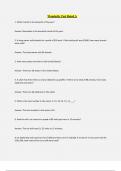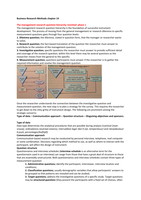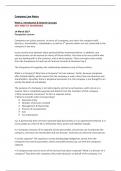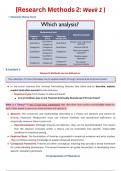Lecture 1
Different types of organizational structures:
Functional structures
Divisional structures
Horizontal structures
Matrix structures
Culture:
- How things are done around here
- Habits, attitudes, pattern of behavior
Open vs. closed organizations
Level of analysis:
- Micro
- Macro
Development organizational structures:
- Fayol and Taylor: Standardization
o Rationalization of jobs
- Bureaucracy
o Who is accountable for what, separate divisions
-
,Lecture 2: Organizational change and
sustainability
Organizational change
- The alteration and transformation of the form so as to survive better in the
environment
- Transform from present state to desired future state to increase effectiveness
Negative consequences of organizational change:
- People losing jobs
- Other people experience increased work pressure due to downsizing
Organizational effectiveness:
- The accomplishment of a common purpose or purposes
- Achieve goals
- Concerned with impact
Types of change
- Evolutionary change
o Gradual
o Incremental
o Narrowly focused
- Revolutionary change
o Radical
o Rapid
o Broadly focused
Planned change
Kurt Lewin
Original purpose to resolve social conflict in society
Four elements
o Field theory/force field analysis
o Group dynamics
o Action research
Strategy for generating and acquiring knowledge that managers can
use to define an organization’s desired future state and to plan a
change program to reach it
o Three-step model of change
Field theory/group dynamics:
- To analyze and understand how social groupings were formed, motivated and
maintained
Action research and the 3-step model of change:
- To change the behavior of social groups
, Advantages of internal change agent:
- Familiar with the culture and processes
Disadvantages of internal change agent:
- Bias
- Your part of the culture you want to change
- People might not accept it from an internal change agent (legitimacy)
Advantage external change agent:
- New perspective
- Objectivity
- Legitimacy (no nepotism)
- Experts in their field
Disadvantage external change agent:
- Costly
Lewin’s 3 step model of change:
1. Unfreeze the organization from its present state
2. Make the desired type of change
3. Refreeze the organization in a new, desired state
Planned change: criticism
- Assumes environmental stability
- Not applicable to situations that need rapid and radical change
- Assumes suitability for all organizations
Emergent approach
- Open ended process
- Adjusting to changing external environment
- Bottom up
Emergent approach: Processual research
Study of organizational change over time and in context
Reject prescriptive, recipe driven approaches
Focus on interrelatedness between individuals, groups, organizations and society
Emergent approach: The more prescriptive camp
- Telling organizations what to do, instead of a detailed analysis
- Moss Kanter: Ten commandments for executing change
- Kotter’s: eight steps to successful change
1. Create a sense of urgency
2. Pull together the guiding team
3. Develop the change vision and strategy
4. Communicate for understanding and buy in
Different types of organizational structures:
Functional structures
Divisional structures
Horizontal structures
Matrix structures
Culture:
- How things are done around here
- Habits, attitudes, pattern of behavior
Open vs. closed organizations
Level of analysis:
- Micro
- Macro
Development organizational structures:
- Fayol and Taylor: Standardization
o Rationalization of jobs
- Bureaucracy
o Who is accountable for what, separate divisions
-
,Lecture 2: Organizational change and
sustainability
Organizational change
- The alteration and transformation of the form so as to survive better in the
environment
- Transform from present state to desired future state to increase effectiveness
Negative consequences of organizational change:
- People losing jobs
- Other people experience increased work pressure due to downsizing
Organizational effectiveness:
- The accomplishment of a common purpose or purposes
- Achieve goals
- Concerned with impact
Types of change
- Evolutionary change
o Gradual
o Incremental
o Narrowly focused
- Revolutionary change
o Radical
o Rapid
o Broadly focused
Planned change
Kurt Lewin
Original purpose to resolve social conflict in society
Four elements
o Field theory/force field analysis
o Group dynamics
o Action research
Strategy for generating and acquiring knowledge that managers can
use to define an organization’s desired future state and to plan a
change program to reach it
o Three-step model of change
Field theory/group dynamics:
- To analyze and understand how social groupings were formed, motivated and
maintained
Action research and the 3-step model of change:
- To change the behavior of social groups
, Advantages of internal change agent:
- Familiar with the culture and processes
Disadvantages of internal change agent:
- Bias
- Your part of the culture you want to change
- People might not accept it from an internal change agent (legitimacy)
Advantage external change agent:
- New perspective
- Objectivity
- Legitimacy (no nepotism)
- Experts in their field
Disadvantage external change agent:
- Costly
Lewin’s 3 step model of change:
1. Unfreeze the organization from its present state
2. Make the desired type of change
3. Refreeze the organization in a new, desired state
Planned change: criticism
- Assumes environmental stability
- Not applicable to situations that need rapid and radical change
- Assumes suitability for all organizations
Emergent approach
- Open ended process
- Adjusting to changing external environment
- Bottom up
Emergent approach: Processual research
Study of organizational change over time and in context
Reject prescriptive, recipe driven approaches
Focus on interrelatedness between individuals, groups, organizations and society
Emergent approach: The more prescriptive camp
- Telling organizations what to do, instead of a detailed analysis
- Moss Kanter: Ten commandments for executing change
- Kotter’s: eight steps to successful change
1. Create a sense of urgency
2. Pull together the guiding team
3. Develop the change vision and strategy
4. Communicate for understanding and buy in










